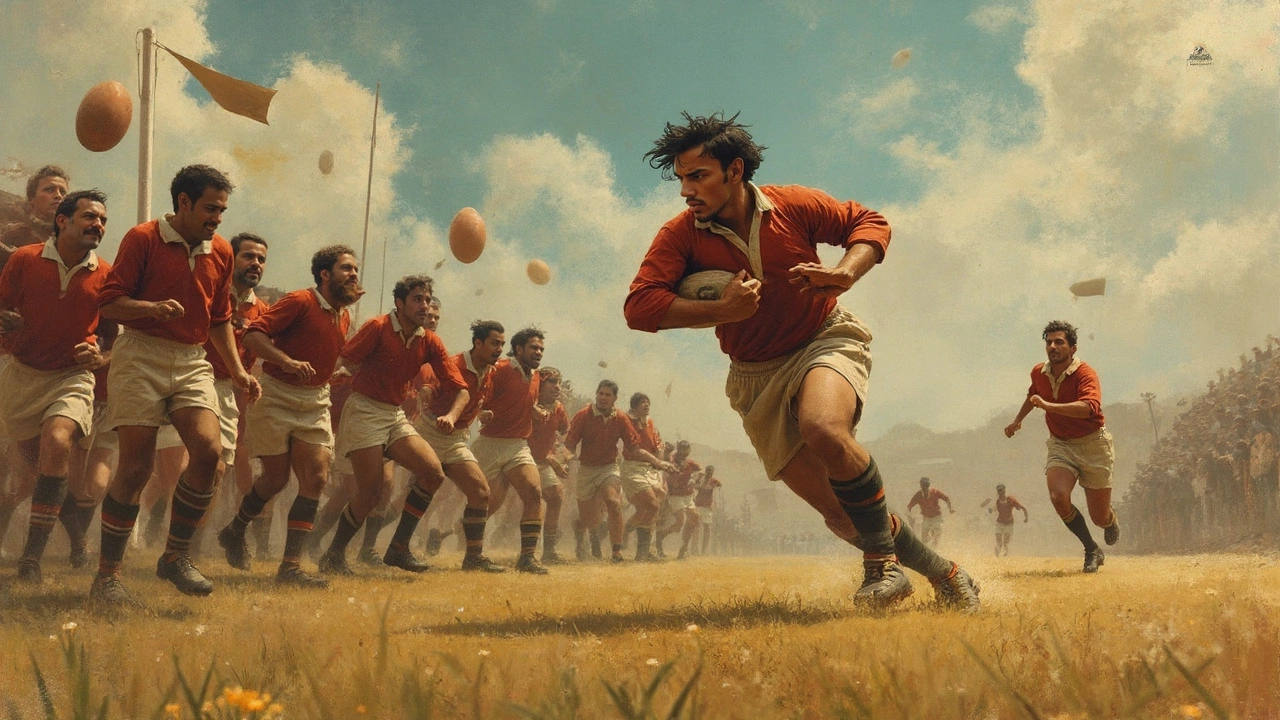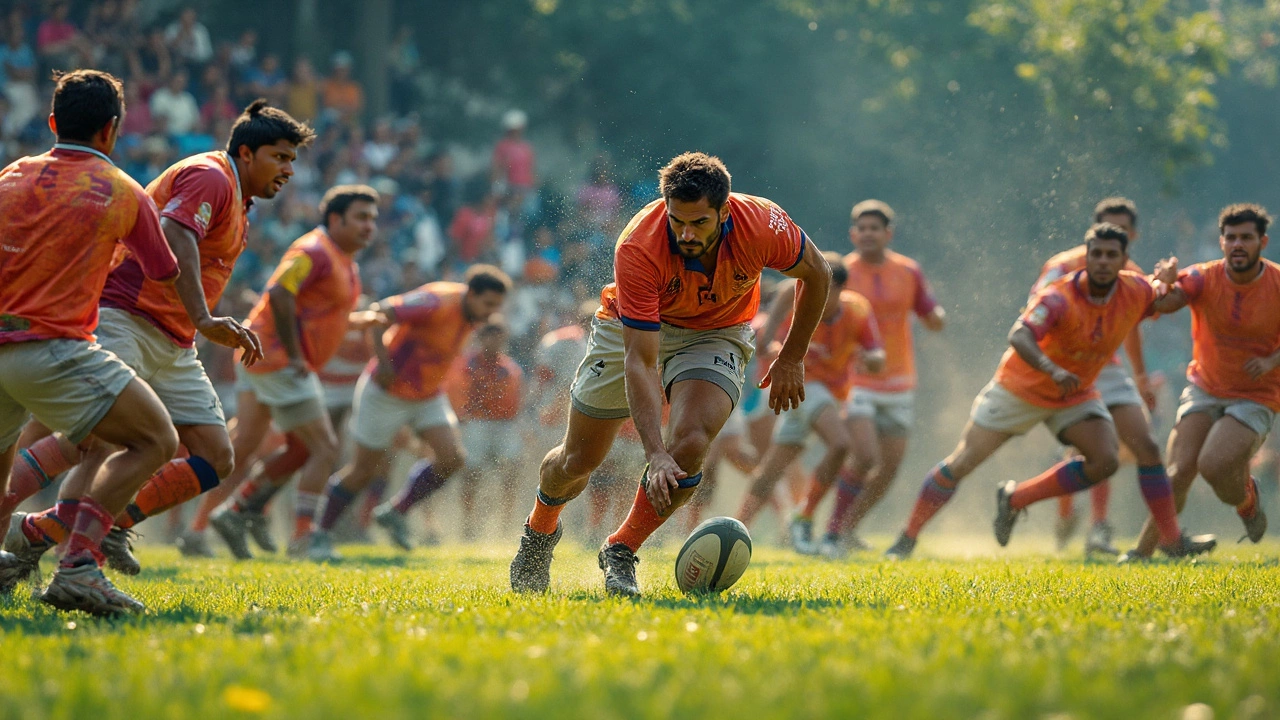If you've spent any time watching rugby, the term 'jackler' has likely popped up in commentary, leaving some scratching their heads. So, what exactly is a jackler? Simply put, it's a player whose job is to win possession of the ball, usually by hovering over tackled opponents and trying to steal or disrupt the ball. But why the name? The term 'jackler' is thought to originate from the word 'jackal,' an animal known for scavenging. Scavenging, in the rugby sense, relates to players scavenging or 'poaching' the ball from their opponents.
Now, diving deeper, the role of the jackler isn't just about brute force; it requires a mix of timing, strength, agility, and an eye for opportunity. Jacklers must be alert and quick, ready to capitalize on mishandled plays and turnovers, making each second on the field count. They’re vital in defensive scenarios, shifting the game’s momentum by turning defense into a potential attack.
Understanding this position helps you appreciate the strategic layer of rugby. It's not just a physical confrontation—it's a battle of wits and tactics. Next time you watch a rugby match, keep an eye out for the jackler and see how they can turn the tide of the game through craftiness and timing.
- Understanding the Jackler
- The Origin of the Term
- Role and Responsibilities
- Impact on Game Tactics
- Key Skills and Training
Understanding the Jackler
The role of the jackler in rugby is undeniably pivotal. This position often draws comparisons to a predator lurking around the action for that split-second opportunity to snatch the ball right out from under the opponent's nose. But it’s not just about instincts; it's an art refined through experience and training.
The primary task of a jackler is to regain possession by skillfully handling the ball during a ruck. They are the first line of defense that turns into an attacking option instantly. When the opponent gets tackled, it's the jackler's moment to shine. They zero in on the ball, deftly maneuvering to either steal or disrupt it, ideally leading to a turnover for their team.
Rugby players who excel in this role know that success is about much more than muscle. According to former England captain and renowned rugby authority, Martin Johnson, "A good jackler is not just strong; they are intelligent. They know when to attack and when to hold off."
"Rugby is a game with a clear objective and that requires real intelligence; and the jackler, like no other player, must understand the broader tactics." — Martin Johnson
Deciphering when to attempt a 'jackal' (the act of turnovers) is what separates a brilliant jackler from an average one. Trying too soon can lead to penalties, while hesitating loses the brief window of opportunity. They must weigh the risks, remembering that getting penalized can give the opposition added advantage.
Physical and Mental Attributes
Physically, jacklers are usually among the fittest on the team. They need the endurance to keep up and the strength to tussle for the ball. More than that, though, they need mental sharpness to read the game and anticipate plays. The combination of these attributes makes them stand out.
- A keen sense of timing to decide when to contest for the ball.
- Solid understanding of rules to avoid unnecessary penalties.
- Constant awareness of their team and the opposition's formations.
So, while it might look chaotic on the field, the jackler's actions are anything but. Every move is calculated, every second counts, and that's what makes understanding this role even more fascinating. The game relies on them to seize those fleeting opportunities, turning defense into swift offense.
Role and Responsibilities
When we talk about what a jackler does in rugby, it's all about timing and instinct. Remember, this isn't just about being a brute on the field. It's about knowing when to act and doing it right. Let's break down these responsibilities a bit more.
Winning the Ball
The primary job of a jackler is to gain possession of the ball when their team doesn’t have it. This usually happens just after a tackle. The jackler has to be quick to get to the ball, often holding their stance like a jackal over its prey, hence the name.
Causing Turnovers
A significant way a jackler contributes is by creating turnovers. This means interrupting the opponent's attack, either by stripping them of the ball or forcing a penalty. This skill can shift momentum drastically in favor of the jackler’s team.
Pressure and Disruption
Aside from directly handling the ball, jacklers play a key role in disrupting the opposing team’s rhythm. By putting pressure on the ball carrier, they can force errors and slow down the opponent's play, giving their own teammates a breather and a chance to regroup their defense.
Defensive Anchor
One less obvious responsibility is the jackler's role in bolstering the team’s defense. Their presence can deter opponents from chancing risky plays, given the threat of a turnover or penalty.
To wrap it all up, a proficient jackler can be a real game-changer. They need agility, strength, and a good dose of rugby smarts to know when a turnover opportunity arises. Watching a skilled jackler in action provides a unique glimpse into the strategic depth of rugby.

Impact on Game Tactics
When it comes to rugby, the importance of a jackler cannot be overstated. Their role is like having a secret weapon ready to pounce at the right moment. The jackler's ability to disrupt the opponent's flow is crucial, often leading to game-changing scenarios.
Turning Defense into Offense
A proficient jackler can instantly flip the momentum by securing ball possession from a defensive position. Picture this: your team is under pressure, the opponent's attack is relentless, but your jackler steals the ball. Suddenly, you have a chance to attack, shifting the whole game dynamic. It's like a chess match, one move altering the state of play entirely.
Forcing Mistakes
The presence of a jackler on the field forces the attacking team to commit more players to the ruck, disrupting their offensive plans. When done right, it leads to rushed passes, handling errors, and ultimately, turnovers. The jackler thrives on these mistakes, ready to exploit any slip in concentration.
Decision-making Pressure
Opposing teams often find themselves pressured into making rapid decisions because of the jackler’s presence. Do they commit more players to secure the ball or risk losing it? This strategic dilemma can tilt the game in favor of the team with a strong jackler.
Stats Don’t Lie
In top-tier matches, turnovers won by jacklers have been recorded as a leading indicator of success. Teams that can effectively steal possession, typically orchestrated by their jackler, see a significant advantage in overall winning percentages.
| Teams with Effective Jacklers | Winning Percentage |
|---|---|
| Team A | 65% |
| Team B | 70% |
| Team C | 68% |
This doesn’t mean teams only rely on their jacklers, but having a proficient one ensures that they can exploit these tactical advantages when opportunities arise.
Key Skills and Training
If you're eyeing the role of a jackler in rugby, you've got to bring a mix of skills to the field. Not only are physical attributes essential, but mental sharpness and strategic thinking play a huge role too. Let's break down what makes a top-notch jackler.
Physical Strength and Agility
The modern rugby game demands players be in peak physical condition. Jacklers need to combine strength with mobility. Your upper body strength is crucial for contesting the ball during breakdowns, while agility helps you quickly respond to dynamic game situations. Training routines often include bodyweight exercises, resistance training, and agility drills.
Discipline and Technique
Being a successful jackler hinges on technique. Observing the right moment to attempt a turnover and executing it legally within the game's rules is vital. Practicing tackling and quick ball-getting techniques will make you an invaluable asset to your team.
Reading the Game
Perhaps more than any other position, a jackler needs the ability to read the game as it unfolds. This means predicting ball movements and positioning yourself to capitalize on any loose balls. As the often-quoted saying by rugby coach Steve Hansen goes:
"It's about being two or three steps ahead in a fast-paced game, knowing where the ball will be, not where it is now."
Endurance and Recovery
Rugby is demanding; endurance is key for maintaining performance throughout the match. Training for jacklers involves balanced cardio routines to enhance stamina. Recovery is just as crucial; think of ice baths and proper nutrition as standard.
| Skill | Description |
|---|---|
| Strength | Builds ability to contest effectively. |
| Agility | Facilitates rapid response to changing plays. |
| Strategy | Enables prediction and positioning. |
| Endurance | Maintains performance throughout the match. |
Conclusion
Focusing on these areas of development can set you apart and make you a formidable jackler. It's a role that thrives on the balance of physical prowess and mental agility. If you're passionate about mastering it, gear up for some rigorous training and be ready to outthink and outplay your opponents.
